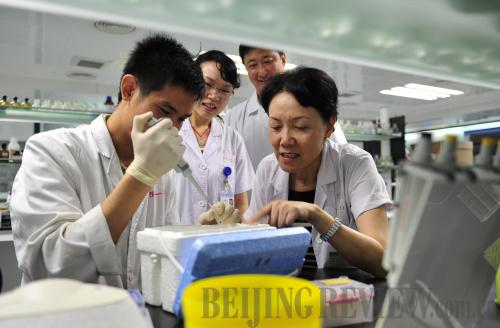|
 |
|
RESEARCHING: Hou Fanfan (first right) instructs her students in a lab on August 20 (LU HANXIN) |
There are over 100 million patients of chronic renal disease—a type of kidney disease that causes the body to deplete its protein through urine, a condition known as nephrosis—in China today, according to inconclusive statistics. Late-stage renal disease can lead to kidney failure, leaving a patient with two options: dialysis or kidney transplantation.
One Chinese doctor, however, has provided a promising alternative to traditional treatment for kidney failure.
Her name is Hou Fanfan, and she led a team that in 2006 discovered a way to battle chronic renal disease. She discovered that angiotensin converting enzyme (ACE) could remarkably reduce the possibility of the disease developing into uremia. Because of their findings, the fight against kidney failure has found new hope.
Sixty-two-year-old Hou, Director of the Renal Division at Nanfang Hospital in Guangzhou and doctoral supervisor at Southern Medical University (SMU), become an academician of the Chinese Academy of Sciences (CAS) in 2009.
Hou's hopes to enter medical school in 1968 in Nanjing after high school were dashed because of the "cultural revolution" (1966-76) underway in China. She was sent to the countryside to receive labor training and was recruited as a soldier to feed cattle at a military hospital.
In 1970, at a time when most people were denied a university education, Hou received a blessing by the military to study at the First Military Medical University (the university was renamed SMU in 2004).
Hou passed her medical exam in 1979 and became a doctor at a military hospital, but she continued to further her knowledge, often reading books in the corridor after the lights were out for the evening. In 1989, she became an associate professor at Nanfang Hospital.
"I hardly imagined I could get this far having begun as a soldier," Hou recalled.
Hou pursued a doctorate at the Zhongshan School of Medicine at the age of 40 surrounded by much younger peers. Graduating in 1993 at the top of her class with a doctorate in hand, Hou set a number of records at the school. She was the oldest person to receive a doctorate at the school, and moreover her thesis won first prize at the national education committee in 1995, which led to her promotion to professor and then chief doctor at SMU.
During a three-year stint as a visiting researcher at Harvard, Hou discovered the causal factors leading to chronic renal disease. Harvard urged Hou to stay on to further her research but she refused, opting instead to return to China in 1999.
"From 1969 when I was recruited as a soldier, to 2009 when I was elected to the CAS, 40 years passed. What a coincidence that every 10 years I would achieve something big," Hou recalled.
Chronic renal disease often leads to kidney failure and is widely regarded as one of the most expensive diseases to treat in the world. By 2010, cumulative spending on renal disease and dialysis treatment had reached $1 trillion worldwide, and curing renal disease has become a global medical challenge. "We must find a new therapy that can effectively slow down the development of renal disease and reduce the rate of uremia. It's an enormous task, but finding remedy is what we do," said Hou.
"The economic burden on families will also be significantly reduced if we can slow the development of the disease," Hou explained.
Statistics show that 120,000 patients received dialysis therapy in China in 2008, costing a total of 9.6 billion yuan ($1.54 billion).
Alleviating patient suffering has been a motivating factor in Hou's quest to cure renal disease. One patient more than a decade ago made an indelible impression.
The man with renal disease was informed that dialysis treatment would cost 65,000 yuan a year ($10,000). He cried with his wife, and told Hou, "My family will collapse if I accept dialysis. I beg you to do what you can to prolong the time before my first dialysis treatment so that I can afford to pay for my daughter's college education."
The patient's desperate plea touched Hou so much that she couldn't eat or sleep for several days, but it was the impetus to move her research forward and discover an alternative treatment for chronic renal disease.
| 